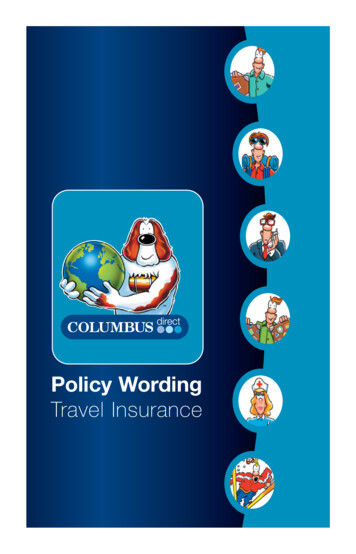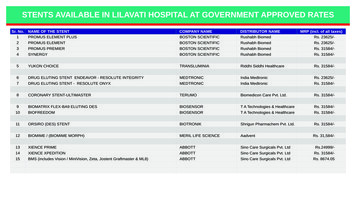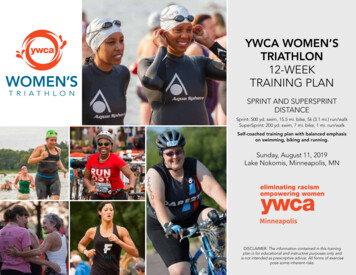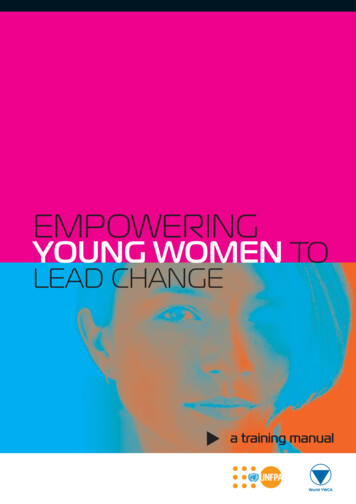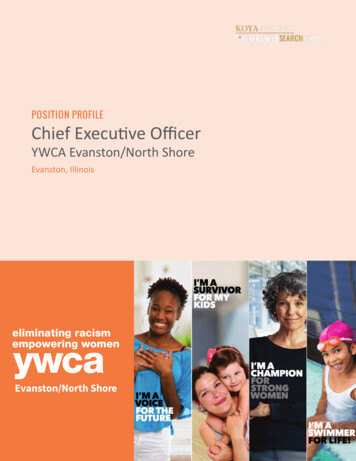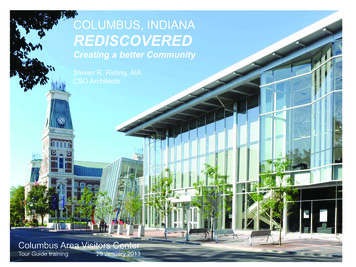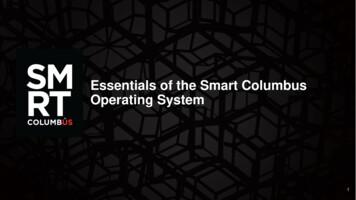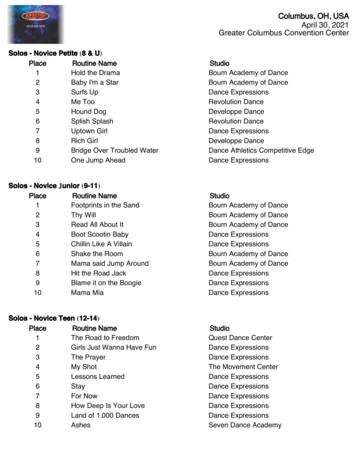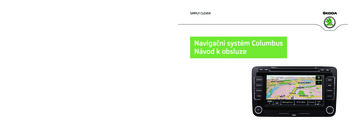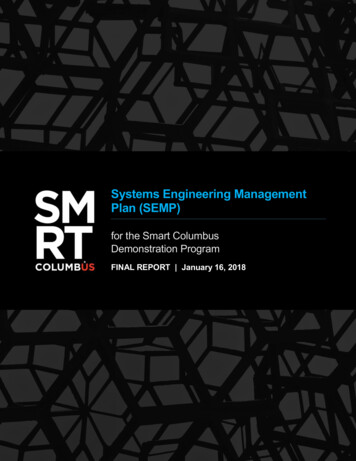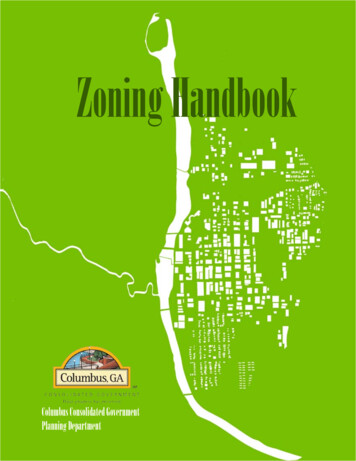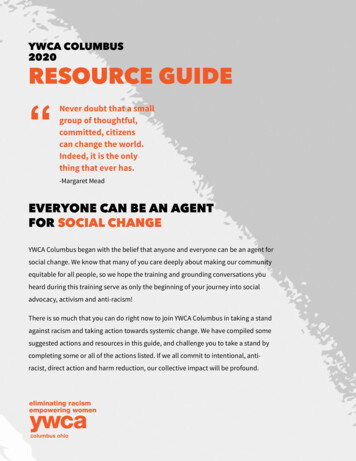
Transcription
YWCA COLUMBUS2020RESOURCE GUIDE“Never doubt that a smallgroup of thoughtful,committed, citizenscan change the world.Indeed, it is the onlything that ever has.-Margaret MeadEVERYONE CAN BE AN AGENTFOR SOCIAL CHANGEYWCA Columbus began with the belief that anyone and everyone can be an agent forsocial change. We know that many of you care deeply about making our communityequitable for all people, so we hope the training and grounding conversations youheard during this training serve as only the beginning of your journey into socialadvocacy, activism and anti-racism!There is so much that you can do right now to join YWCA Columbus in taking a standagainst racism and taking action towards systemic change. We have compiled somesuggested actions and resources in this guide, and challenge you to take a stand bycompleting some or all of the actions listed. If we all commit to intentional, antiracist, direct action and harm reduction, our collective impact will be profound.
GETEDUCATEDINTERACTIVE GUIDE CLICK IMAGES TO VIEW400 YEARS OF INEQUALITYA TIMELINE: VIEW HERE I AM NOTYOUR NEGROSELMA1619A PODCASTFROM THENEW YORKTIMESGIRL TREKBLACKHISTORYBOOT CAMPSTAMPEDFROM THEBEGINNINGTHE SLAVE’SCAUSE: AHISTORY Y IBRAM X. KENDIREADPG 2YWCA COLUMBUS RESOURCE GUIDE 2020BY MANISHA SINHAJIM CROWWISDOM:MEMORY ANDIDENTITY IN BLACKAMERICA SINCE1940 BYJONATHANHOLLOWAY
WHITE PRIVILEGE AND FRAGILITYDR. ROBINDIANGELODISCUSSES‘WHITEFRAGILITY’DEAR EFRAGILITYBY ROBINDEANGELO103 THINGSWHITEPEOPLECAN DOFOR ND WHITEANTI-RACISTORGANIZINGBY BONNIEBERMAN CUSHINGIMPLICIT BIASRACIAL BIAS IS THE UNCONSCIOUS ASSOCIATIONS HUMANS MAKE ABOUT RACIAL GROUPS.Acknowledging and challenging your own bias is critical when examining the ways in whichyou enable racist systems to persist. The Harvard Implicit Association Test measures thestrength of associations between concepts (groups) and evaluations (stereotypes). It is a toolthat can help us recognize unconscious and hidden biases which unknowingly distort ourobjective evaluation and treatment of others based upon race, gender, religion, culture, etc.THE MIND OFTHE VILLAGE:UNDERSTANDINGOUR IMPLICITBIASESTHE AIR WEBREATHE:IMPLICIT BIASAND POLICESHOOTINGSLISTENYWCA COLUMBUS RESOURCE GUIDE 2020 PG 3
INSTITUTIONAL & STRUCTURAL RACISMIN THE CRIMINAL JUSTICE SYSTEMJUST MERCY13TH NetflixHOWAMERICANSLAVERYHELPEDCREATEMODERN DAYPOLICINGNPR ONAMERICANPOLICINGJUSTICE INAMERICANPR’S CODESWITCH- 8 BESTEPISODESON RACETHE NEWJIM CROWBY MICHELLEALEXANDERSLAVERY BYANOTHERNAME: THERE-ENSLAVEMENT OFBLACKAMERICANSWATCHLISTENREADPOLICING THEBLACK MANBY ANGELADAVISEDUCATION SYSTEMTHE SCHOOLTO-PRISONPIPELINE,EXPLAINEDLISTENWATCHREADPG 4NICE WHITEPARENTSBUSINGENDED 20YEARS AGO.TODAY OURSCHOOLS ARESEGREGATEDONCE AGAINYWCA COLUMBUS RESOURCE GUIDE 2020WHY ARE ALLTHE BLACKKIDS SITTINGTOGETHERIN THECAFETERIA?
HEALTH CARE SYSTEMWATCHLISTENTHE USMEDICALSYSTEMIS STILLHAUNTED BYSLAVERYHOW RACISMMAKES USSICK DAVIDR. WILLIAMSNetflixTHE PRAXISPODCAST CONNECTINGTHEORY ANDPRACTICEFOR HEALTHJUSTICEMEDICALAPARTHEIDBY HARRIETWASHINGTONCODE BLUEBY MIKEMAGEEREADHOUSING INEQUITYSEGREGATEDBY DESIGNBY ATTERSLISTENOPPORTUNITYSTARTS ATHOME –RACIAL EQUITY& HOUSINGWITH AMANDAANDERENetflixTHE COLOROF LAW BYRICHARDROTHSTEINREADEVICTED BYMATTHEWDESMONDPG 5
GET ACTIVATED BY CONNECTING WITH YOUR WHY:Movement building requires people who are clearabout who they are and what brings them to theirwork. Knowing who you are, what you care about,and why: these are necessary for anyone committedto collective liberation.“- Charlene Carruthers Unapologetic – A Black Queer and Feminist Mandate fo Radical MovementsRacism, police brutality and social injustice impact us all. Identifying why you want to fight for Blacklives and how you will do it is the first step in taking a stand against racism.Take a moment to write down how the recent police violence and protests haveACTIONmade you feel, and why that makes you want to stand against injustice.CONNECTING WITH YOUR COMMUNITYIf you want to see racism and police brutality end, you are not alone. Our community is fightingfor change and we have each other’s backs. When we take steps toward change together, we covermuch more ground.ACTION Connect with your family, friends and neighbors. Ask them how they are takingaction to fight against racism and share this resource guide with them.ACTION Raise anti-racist kids! Prepare to have conversations with your children about raceand oppression. Children are learning about race and racism everyday by observingthe culture of white supremacy around them. If you want your child to be antiracist, you must help them to unlearn the things they are observing everyday byhaving intentional conversations about racism and allyship with them. Check outorganizations like the conscious kid for more resources.ACTION Find activists and organizations who have already made plans to take a standagainst racism and ask how you can join in. We’ve listed some local organizationsbelow. This list is not exhaustive and there are plenty of other organizationsfocusing on a racial justice in addition to other social justice issues. This listincludes organizations that take more direct action, but you can find additionalinstitutions to support on the next page.PG 6YWCA COLUMBUS RESOURCE GUIDE 2020
LOCAL ACTIVISTS AND ORGANIZATIONS TAKING A STAND AGAINST RACISMThis list is not meant to be exhaustive and only includes organizations that take more direct action,but you can find additional institutions to support below.BLACK QUEERINTERSECTIONAL COLUMBUSPEOPLE’S JUSTICE PROJECTFREE THEM ALLNATIONAL LAWYERS GUILDCOMMUNITY FREEDOMCOALITIONSURJ COLUMBUSPRISONERS JUSTICE LEAGUEUNITE FOR REPRODUCTIVE &GENDER EQUITYFEMINIST FLAG CORPSCENTRAL OHIO STREETMEDIC COLLECTIVEYWCA COLUMBUSCOLUMBUS FOOD NOTBOMBSGOVERNMENT ALLIANCE ONRACE & EQUITYZORA’S HOUSEYWCA COLUMBUS RESOURCE GUIDE 2020 PG 7
ACTIONConsider how you are approaching community engagement and change. The Dialogueto Change Process (below), developed by Everyday Democracy, is a four-step processto describe how leaders, community organizers, and facilitators can create equitablecommunity engagement.1234ORGANIZINGMaking sure the right people are included in the Dialoguegroups. Participants should reflect the community, diverse inrace, gender, age, gender identity and socioeconomics. Thisstage can take four to six months.DIALOGUESMany small groups, sometimes called Study Circles, led by local,trained, facilitators, meet weekly for four to six weeks. Thesegenerally consist of eight to 12 people each, and may use anEveryday Demorcracy topic-specific discussion guide.ACTIONEVALUATION,COMMUNICATION& FOLLOW-UPGroups come together after the Dialogues to share findings andagree on action steps.Everyday Democracy remains in touch, providing follow-upsupport and feedback, help for communities in sharing storiesof their work and progress and incorporating outcomes andlessons learned into our own knowledge and work.Organizing Engagement 2020, Everyday Democrcacy. (n.d.). A dialogue to change process. Retrieved from o-change-process/RAISING YOUR VOICEOne of the most powerful things we can do is physically show up and let our voices be heard. Takingpart in a demonstration or protest helps to raise public awareness, highlight injustice, and to disrupt thestatus quo.ACTIONPG 8Find out about local racial justice protests, marches,rallies and events byvisiting @YWCACBUSSocialJustice, or plan your own using the communityorganizing chart referenced below. We all have the ability to organize in ourcommunities and strategize how we fight for change. Check out this videoabout movement building.YWCA COLUMBUS RESOURCE GUIDE 2020
COMMUNITY ORGANIZING CHARTRAISING FUNDSFunding the fight for racial justice is a huge part of the battle!ACTIONHelp to raise funds for the families of victims of police brutality, the protestorswho were arrested for speaking up for what they believe in, or the organizationsfighting for change in our city. Donate to help protestors and activists fighting forBlack lives - Aftercare Fund Go Fund Me.ACTIONDonate to the organizations fighting against systemic racism like YWCA Columbus,Columbus Freedom Fund, CUL, NAACP, Black Lives Matter, Campaign Zero, Colorof Change or any of the organizations listed above. In addition to organizations,it is imperative that we pay our BIPOC (Black, Indigenous, and people of color)activists for their insight and hard work. Many organizers and grassrootsorganizations always have their boots on the ground, and we significantly benefitfrom their efforts. It’s past time to pay organizers and activists so they can keepthe work going and support themselves.YWCA COLUMBUS RESOURCE GUIDE 2020 PG 9
GETTING POLITICALInstating laws and electing candidates that contribute to racial equity is an essential way to create lastingsystemic change. That is why it is important that those of us with access to the privilege of voting do so inevery election, and that we stay politically active and informed.ACTIONReference this voter guide to make a plan to vote, to help your community voteand to ensure fair and safe elections.ACTIONKnow who and what is on your ballot by visiting vote411.org!ACTIONVisit votesaveamerica.org to learn how you can take part in election protection.ACTIONContact your elected officials to let them know what you care about. Find thenames and contact information of your elected officials here.ACTIONStay informed about the decisions our local government is making by joining avirtual city council meeting on Facebook: @ColsCouncil and subscribe to the Cityof Columbus YouTube channel.ACTIONWork to combat the school-to-prison pipeline. Call your local school board andadvocate for regular implicit bias training for teachers, administrative staff, andresource officers. Advocate against schools using resource officers as means tohandle discipline and encourage police community relations training.ADVOCATING FOR HOUSING JUSTICEYWCA Columbus is fighting for housing justice in our city because we know that systemic racismand discrimination has contributed to women and people of color experiencing homelessness atdisproportionate rates in Ohio and all over the United States. Join us by advocating for equity in ourhousing system and supporting women and families experiencing homelessness.ACTIONAttend your Area Commission meetings to learn about new developmenthappening in your neighborhood and its potential impact, especially aroundzoning. When residents are considering projects for your communities, you mayhear push back related to a project “bringing in crime,” “creating too muchdensity,” or “changing the look of the neighborhood” and these could be red flagsof bias.ACTIONSet up a screening of Segregated by Design with your peers.ACTIONVolunteer to drop off goods and serve a meal at the YWCA Columbus Family Center.ACTIONVolunteer with Habitat for Humanity to build homes for low income families.PG 10 YWCA COLUMBUS RESOURCE GUIDE 2020
SUPPORTING BLACK CREATIVES AND CULTURESupport Black creatives and cultural organizations and immerse yourself in art focused on racial justice.ACTIONVisit an exhibit at The King Arts Complex, walk along the Long Street Cultural Wallto absorb historical information about the Near East Side. Learn about local artistsof color by following the Maroon Arts Group and King Arts Complex on Instagram@maroonartsgroup @kingartscomplex.ACTIONTake a road trip to the National Underground Railroad Freedom Center inCincinnati.ACTIONResearch local and national black-owned businesses and intentionally shop at andsupport those companies.YWCA COLUMBUS RESOURCE GUIDE 2020 PG 11
WORKS CITED“A Guide to Indigenous Land Acknowledgment.” Native Governance Center, 14 May owledgment/.Adder, Michael de. 2 June 2020, lds, Rhiannon. 9 July 2020, The Power With In Community Organizing - RestoringOurselves Building Power Creating Change. Lecture presented at Leadership for SocialChange Community Organizing Session in Ohio, Columbus.Coz, Emily Le, et al. “Tough on Crime.” Bias on the Bench Sarasota Herald-Tribune MediaGroup Bauer, projects.heraldtribune.com/bias/bauer/.Crenshaw Follow, Kimberle Williams, and Luke Charles Harris. “Affirmative Action:Competing Conceptions of Running the Race.” SlideShare, African American PolicyForum, 7 Nov. 2007, ty vs. Equity.” Raleigh City Council District B, brianfitznc.com/issues/equality-vsequity/.Ibrahim, Nur. “How Accurate Are Memes Comparing Tamir Rice and Kyle Rittenhouse?”Snopes.com, use-memes/.Maeda, John. “Design in Tech Report 2019: Section 6: Addressing Imbalance.” John Maeda Design in Tech Report, 11 Mar. sign-in-tech-report-2019-section 6-addressing-imbalance/.Nelson, Julie, et al. The Local & Regional Government Alliance on Race and Equity, 2015,Advancing Racial Equity and Transforming Government: A Resource Guide to Put IdeasInto Action.Salman, Josh, et al. “Tough on Crime.” Bias on the Bench, 12 Dec. 2016, projects.heraldtribune.com/bias/bauer/.Sanders, Wren. “Survivor of Racist Central Park Incident Is a Pioneer of QueerRepresentation in Comics.” Them., Them., 26 May 2020, www.them.us/story/survivor ntation.“Territorial Acknowledgements.” Oregon State University Extension Service - OutdoorSchool, Extension Service Outdoor School, 2020, outdoorschool.oregonstate.edu/equity ts/.The Sentencing Project, 2013, Shadow Report to the United Nations on Racial Disparitiesin the United States Criminal Justice System, iminal-justice-system/.PG 12 YWCA COLUMBUS RESOURCE GUIDE 2020
deangelo race traitor podcast series the air we breathe: implicit bias and police shootings 103 things white people can do for racial justice accounta-bility . sick david r. williams netflix opportunity starts at home - racial equity & housing with amanda andere netflix the praxis podcast - connecting theory and practice
